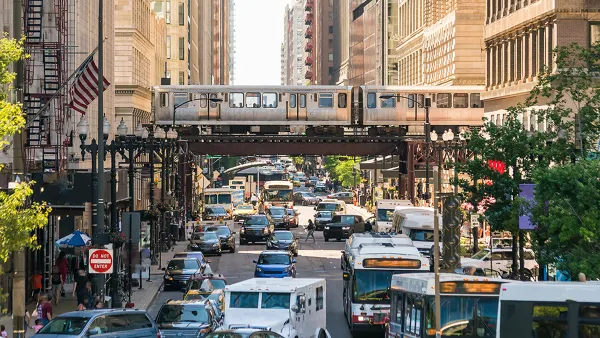The New York Times, in a front page article, was startled to conclude that the housing market continued to suffer, because "buyers now demand something smaller, cheaper and, thanks to $4 a gallon gas, as close to their jobs as possible."
Christopher Leinberger, writing for The New Republic, says the Times is a little late to discover this fact:
"Ironically, the Times dateline was Chicago. That's the home of Scott Bernstein and the Center for Neighborhood Technology which has been doing some of the best national research on the location within metro areas of the housing bust. CNT's conclusion from way back in 2008? The mortgage collapse took place on the auto-dominated suburban fringe while walkable urban housing, whether in the city or the suburbs, pretty much held its value."
The original story in the NYT includes a closeup on a developer so desperate to sell his traditional suburban houses that he's throwing in a car with every purchase.
Thanks to Emily Robinson
FULL STORY: Walk, Don't Drive, to the Real Estate Recovery

Planetizen Federal Action Tracker
A weekly monitor of how Trump’s orders and actions are impacting planners and planning in America.

Chicago’s Ghost Rails
Just beneath the surface of the modern city lie the remnants of its expansive early 20th-century streetcar system.

Amtrak Cutting Jobs, Funding to High-Speed Rail
The agency plans to cut 10 percent of its workforce and has confirmed it will not fund new high-speed rail projects.

Ohio Forces Data Centers to Prepay for Power
Utilities are calling on states to hold data center operators responsible for new energy demands to prevent leaving consumers on the hook for their bills.

MARTA CEO Steps Down Amid Citizenship Concerns
MARTA’s board announced Thursday that its chief, who is from Canada, is resigning due to questions about his immigration status.

Silicon Valley ‘Bike Superhighway’ Awarded $14M State Grant
A Caltrans grant brings the 10-mile Central Bikeway project connecting Santa Clara and East San Jose closer to fruition.
Urban Design for Planners 1: Software Tools
This six-course series explores essential urban design concepts using open source software and equips planners with the tools they need to participate fully in the urban design process.
Planning for Universal Design
Learn the tools for implementing Universal Design in planning regulations.
Caltrans
City of Fort Worth
Mpact (founded as Rail~Volution)
City of Camden Redevelopment Agency
City of Astoria
City of Portland
City of Laramie





























